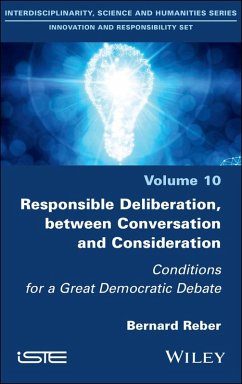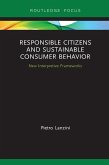Responsible Deliberation, between Conversation and Consideration (eBook, ePUB)
Conditions for a Great Democratic Debate


Alle Infos zum eBook verschenken

Responsible Deliberation, between Conversation and Consideration (eBook, ePUB)
Conditions for a Great Democratic Debate
- Format: ePub
- Merkliste
- Auf die Merkliste
- Bewerten Bewerten
- Teilen
- Produkt teilen
- Produkterinnerung
- Produkterinnerung

Hier können Sie sich einloggen

Bitte loggen Sie sich zunächst in Ihr Kundenkonto ein oder registrieren Sie sich bei bücher.de, um das eBook-Abo tolino select nutzen zu können.
Communication is a crucial issue in our complex societies tinted by distrust. It is the core of democratic life and almost all human and social actions. Therefore it is essential for communication to be responsible. But responsible communication cannot only be conceived as a deontological issue, framed by ethical compliance requirements or good practices promotion. It should be considered with all the virtualities of communication, from conversation to consideration, going through narrative, interpretation and argumentation. Indeed each of these communicational capacities has its properties,…mehr
- Geräte: eReader
- mit Kopierschutz
- eBook Hilfe
- Größe: 0.39MB
![Body Language (eBook, ePUB) Body Language (eBook, ePUB)]() Elizabeth KuhnkeBody Language (eBook, ePUB)11,99 €
Elizabeth KuhnkeBody Language (eBook, ePUB)11,99 €![Responsible Citizens and Sustainable Consumer Behavior (eBook, ePUB) Responsible Citizens and Sustainable Consumer Behavior (eBook, ePUB)]() Pietro LanziniResponsible Citizens and Sustainable Consumer Behavior (eBook, ePUB)20,95 €
Pietro LanziniResponsible Citizens and Sustainable Consumer Behavior (eBook, ePUB)20,95 €![Psychology at the Movies (eBook, ePUB) Psychology at the Movies (eBook, ePUB)]() Skip Dine YoungPsychology at the Movies (eBook, ePUB)25,99 €
Skip Dine YoungPsychology at the Movies (eBook, ePUB)25,99 €![People and Profits? (eBook, ePUB) People and Profits? (eBook, ePUB)]() Joshua Daniel MargolisPeople and Profits? (eBook, ePUB)39,95 €
Joshua Daniel MargolisPeople and Profits? (eBook, ePUB)39,95 €![Psychology Textbook (eBook, ePUB) Psychology Textbook (eBook, ePUB)]() IntroBooks TeamPsychology Textbook (eBook, ePUB)2,99 €
IntroBooks TeamPsychology Textbook (eBook, ePUB)2,99 €![Cultures in Conversation (eBook, ePUB) Cultures in Conversation (eBook, ePUB)]() Donal CarbaughCultures in Conversation (eBook, ePUB)38,95 €
Donal CarbaughCultures in Conversation (eBook, ePUB)38,95 €![Conversation Analysis (eBook, ePUB) Conversation Analysis (eBook, ePUB)]() Numa MarkeeConversation Analysis (eBook, ePUB)48,95 €
Numa MarkeeConversation Analysis (eBook, ePUB)48,95 €-
-
-
Dieser Download kann aus rechtlichen Gründen nur mit Rechnungsadresse in A, B, BG, CY, CZ, D, DK, EW, E, FIN, F, GR, HR, H, IRL, I, LT, L, LR, M, NL, PL, P, R, S, SLO, SK ausgeliefert werden.
- Produktdetails
- Verlag: For Dummies
- Seitenzahl: 304
- Erscheinungstermin: 8. November 2023
- Englisch
- ISBN-13: 9781394255641
- Artikelnr.: 69462647
- Verlag: For Dummies
- Seitenzahl: 304
- Erscheinungstermin: 8. November 2023
- Englisch
- ISBN-13: 9781394255641
- Artikelnr.: 69462647
- Herstellerkennzeichnung Die Herstellerinformationen sind derzeit nicht verfügbar.
Acknowledgments xv
Introduction xvii
Part 1 As Many Critiques as There Are Deliberations 1
Chapter 1 From Defiant Critical Citizenship to Pluralist Political Critique
5
1.1 Testing critical citizenship 7
1.2 Critique as defiance 8
1.2.1 Relational critique 8
1.3 Stealth democracy versus sunshine democracy 11
1.4 From reactive critique to pluralist political critique 14
1.5 The critique of common sense 18
1.6 Intensity of critique towards democracy and propensity to engage 20
1.7 Comparative attractiveness of five features of democracy 25
1.8 From critical citizenship to citizenship critique 26
1.8.1 Democracy, citizenship and types of critique 27
1.8.2 Beyond the four types of critique: communication, responsibility and
burdens of judgment 29
1.9 An unusual debate to tame the critics' 34
Chapter 2 Multiple and Conflicting Origins of Deliberative Democracy 43
2.1 Recent and deflationary definition of deliberative democracy 46
2.2 The sources of deliberative democracy 48
2.2.1 Eight phases in the evolution of a conflict theory 48
2.2.2 Late arrival of philosophy? 51
2.2.3 Three additional steps in the history of TDD 53
2.2.4 A division into two generations 59
2.3. Questionable developments, remaining problems and the promise of
theory 60
2.4 TDD from three other perspectives 63
2.5 Contested deliberation and probation 68
Part 2 Disseminated Deliberation between Empirical Analyses and Theoretical
Disputes 77
Chapter 3 Deliberation, Argumentation, Multiscale Agreement Modes 79
3.1 Fragmented deliberations under institutional constraints 80
3.2 Access to the agreements 85
3.3 Philosophy and practical deliberations 92
3.3.1 Theory and empirical differences 92
3.3.2 Constructive or critical philosophy 94
3.3.3 Mobilization of philosophy for empirical work 97
3.4 Guaranteed or "unfiltered" deliberation? 102
Chapter 4 More than a "Familial Dispute" at the Foundation of Deliberative
Democracy 109
4.1 Between Rawls and Habermas, incompatible perspectives 111
4.1.1 Disputes about the limits of politics and the instruments of
representation (Rawlsian division) 114
4.1.2 Playing Rawls against Rawls (Habermasian reconstruction) 114
4.2 Disagreements at the heart of deliberative tools: reflective
equilibrium and argumentation 116
4.2.1. The equilibrium control of the conjecture of the original position
(Rawls) 116
4.2.2 Reflective equilibrium well understood (Habermas) 118
4.2.3 Theory of incomplete argumentation (Rawls) 119
4.3 Challenges of pluralism and limits of reflective equilibrium 120
4.3.1 Pluralism at the heart of the judgment 121
4.4 Reflective equilibriums put to the test 125
4.4.1 Recomposition of the burdens of judgment 126
4.4.2 Burdens of judgment in search of equilibrium 128
4.5 The law at the risk of democratic debate 130
Part 3 Embodied Rhetoric and Complex Political System 135
Chapter 5 Argumentation Put Into Question 143
5.1 Argumentation, the key to saving communicative rationality 144
5.1.1 Problems of the relationship between reasons and validity 147
5.1.2 Importance of the relationship between reasons and validity 150
5.2 Enigmatic Habermasian additions on argumentation 152
5.3 Expectations and disappointed promises of argumentative hopes 158
5.4 Give up? 160
5.5 Venturing out as the situation requires 163
5.6 Types of questions and components of the argument 165
5.7 The frameworks of argumentation 169
5.8 Arguing, from law to politics 172
5.9 Argumentation, legal methodology, social justice 174
Chapter 6 From Conversation to Consideration 183
6.1 Communication capacities 183
6.1.1 Narration 186
6.1.2 Interpretation 186
6.1.3 Combinations of communication capacities 187
6.2 Conversation 189
6.3 Consideration 194
6.4 Issues, circumstances and responsibilities 198
6.4.1 General issues (hexameter) fixing the circumstances 199
6.4.2 Detailed responsibilities 200
6.4.3 The will is not only a matter of conflicting desires 201
6.4.4 Communicating, from circumstances to political responsibilities 204
6.5 Rhetoric, as essence and perfection of language 206
6.6 System of deliberative systems 212
6.6.1 System functions and levels of pluralism 214
6.6.2 From social deliberation to deliberative systems 216
6.7 Deliberative stage system and expertise 218
Conclusion 225
References 237
Index 251
Acknowledgments xv
Introduction xvii
Part 1 As Many Critiques as There Are Deliberations 1
Chapter 1 From Defiant Critical Citizenship to Pluralist Political Critique
5
1.1 Testing critical citizenship 7
1.2 Critique as defiance 8
1.2.1 Relational critique 8
1.3 Stealth democracy versus sunshine democracy 11
1.4 From reactive critique to pluralist political critique 14
1.5 The critique of common sense 18
1.6 Intensity of critique towards democracy and propensity to engage 20
1.7 Comparative attractiveness of five features of democracy 25
1.8 From critical citizenship to citizenship critique 26
1.8.1 Democracy, citizenship and types of critique 27
1.8.2 Beyond the four types of critique: communication, responsibility and
burdens of judgment 29
1.9 An unusual debate to tame the critics' 34
Chapter 2 Multiple and Conflicting Origins of Deliberative Democracy 43
2.1 Recent and deflationary definition of deliberative democracy 46
2.2 The sources of deliberative democracy 48
2.2.1 Eight phases in the evolution of a conflict theory 48
2.2.2 Late arrival of philosophy? 51
2.2.3 Three additional steps in the history of TDD 53
2.2.4 A division into two generations 59
2.3. Questionable developments, remaining problems and the promise of
theory 60
2.4 TDD from three other perspectives 63
2.5 Contested deliberation and probation 68
Part 2 Disseminated Deliberation between Empirical Analyses and Theoretical
Disputes 77
Chapter 3 Deliberation, Argumentation, Multiscale Agreement Modes 79
3.1 Fragmented deliberations under institutional constraints 80
3.2 Access to the agreements 85
3.3 Philosophy and practical deliberations 92
3.3.1 Theory and empirical differences 92
3.3.2 Constructive or critical philosophy 94
3.3.3 Mobilization of philosophy for empirical work 97
3.4 Guaranteed or "unfiltered" deliberation? 102
Chapter 4 More than a "Familial Dispute" at the Foundation of Deliberative
Democracy 109
4.1 Between Rawls and Habermas, incompatible perspectives 111
4.1.1 Disputes about the limits of politics and the instruments of
representation (Rawlsian division) 114
4.1.2 Playing Rawls against Rawls (Habermasian reconstruction) 114
4.2 Disagreements at the heart of deliberative tools: reflective
equilibrium and argumentation 116
4.2.1. The equilibrium control of the conjecture of the original position
(Rawls) 116
4.2.2 Reflective equilibrium well understood (Habermas) 118
4.2.3 Theory of incomplete argumentation (Rawls) 119
4.3 Challenges of pluralism and limits of reflective equilibrium 120
4.3.1 Pluralism at the heart of the judgment 121
4.4 Reflective equilibriums put to the test 125
4.4.1 Recomposition of the burdens of judgment 126
4.4.2 Burdens of judgment in search of equilibrium 128
4.5 The law at the risk of democratic debate 130
Part 3 Embodied Rhetoric and Complex Political System 135
Chapter 5 Argumentation Put Into Question 143
5.1 Argumentation, the key to saving communicative rationality 144
5.1.1 Problems of the relationship between reasons and validity 147
5.1.2 Importance of the relationship between reasons and validity 150
5.2 Enigmatic Habermasian additions on argumentation 152
5.3 Expectations and disappointed promises of argumentative hopes 158
5.4 Give up? 160
5.5 Venturing out as the situation requires 163
5.6 Types of questions and components of the argument 165
5.7 The frameworks of argumentation 169
5.8 Arguing, from law to politics 172
5.9 Argumentation, legal methodology, social justice 174
Chapter 6 From Conversation to Consideration 183
6.1 Communication capacities 183
6.1.1 Narration 186
6.1.2 Interpretation 186
6.1.3 Combinations of communication capacities 187
6.2 Conversation 189
6.3 Consideration 194
6.4 Issues, circumstances and responsibilities 198
6.4.1 General issues (hexameter) fixing the circumstances 199
6.4.2 Detailed responsibilities 200
6.4.3 The will is not only a matter of conflicting desires 201
6.4.4 Communicating, from circumstances to political responsibilities 204
6.5 Rhetoric, as essence and perfection of language 206
6.6 System of deliberative systems 212
6.6.1 System functions and levels of pluralism 214
6.6.2 From social deliberation to deliberative systems 216
6.7 Deliberative stage system and expertise 218
Conclusion 225
References 237
Index 251







